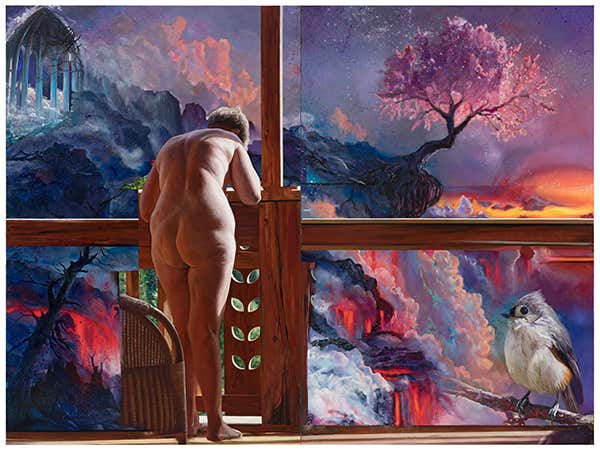Morrison & Foerster Successfully Helps Renowned Painter Martin Eder Win Landmark Copyright Case Before Berlin Regional Court
In a landmark ruling on the pastiche copyright exemption, the Berlin Regional Court (Conway ./. Eder, 15 O 551/19) has upheld the constitutionally protected Freedom of the Arts as guaranteed under both the EU Charter of Fundamental Rights and the German Constitution, and thus helped renowned German painter Martin Eder to get justice. In its judgment, the Berlin Regional Court ruled that the reference to a pre-existing digital work by means of collage-like integration into a new painted work by Martin Eder is fully permissible as a so-called “pastiche” and does not constitute a copyright infringement of such pre-existing work. One speaks of a pastiche when an existing work (in whole or in part) or a typical style is being taken over into a new artwork where a dialogue with such referenced work takes place.
This judgment by the Regional Court of Berlin is one of the first rulings on the pastiche copyright exemption, which has long been recognized in German copyright law, but has only been expressly included in the German Copyright Act with an extra paragraph (Section 51a UrhG) since July 2021. An appeal against the judgment is permitted. Under European Union law, the pastiche has been anchored as a copyright exemption since 2001 in the InfoSoc Directive.
In its judgment, the Regional Court of Berlin emphasizes the importance of the pastiche copyright exemption in the context of the artistic dialogue with digital artworks within “analog” art, such as the painting in question. This goes along with the reasoning of the lawmaker, which emphasizes that the pastiche exemption also has to take into consideration the increasing digitization, new technical inventions, and corresponding new ways of interacting with digital works. The judgment therefore reaches far beyond this individual case and is of general importance for the protection of the Freedom of the Arts.
Background
Martin Eder is a renowned German painter whose works are exhibited and discussed internationally. In his works, Eder deals with the daily flood of images on images from the Internet. In an antithematic and collage-like manner, he incorporates media kitsch into his works, sets it into the art historical context, and translates them stylistically into the classical medium of oil painting. In doing so, Eder's works repeatedly shows the rupture of a supposedly pleasing idyll; representative of this is the oil painting “The Unknowable,” which was the subject matter of the lawsuit.

The Unknowable, Urheber: Martin Eder
The Unknowable, copyright: Martin Eder (reproduced with permission)
The painting, which in the art historical tradition of back paintings, depicts an exposed woman leaning against a window cross with a view into the afterworld, was first (and last) exhibited in a solo exhibition, “Parasites,” by Martin Eder at the Newport Street Gallery in London, a private museum owned by British artist Damien Hirst. In the afterworld, the level behind the window cross, Eder integrated in a delicate painting technique, among other things, a collage-like reference to a blossoming cherry tree on a lava cliff from a digital graphic from the Internet. With additional use of classical art motifs, such as the Monastery Cemetery by Caspar David Friedrich, symbolizing death, Eder paraphrases this “inferno of kitsch” of the blossoming cherry tree and debunks the promise of a supposed paradise through the gaze of the older woman.
The plaintiff, an English “freelance concept artist,” claims to be the creator of the digital cherry tree graphic. By referencing it in Eder's painting and by the exhibition of the painting, the plaintiff saw his alleged copyright in the digital image infringed and therefore filed an action for injunctive relief (first in the proceedings for interim relief and finally in the main action) before the Berlin Regional Court. At the same time, the plaintiff publicly accused Martin Eder of plagiarism on social media.
Whether the plaintiff is actually the creator and copyright owner of this graphic, which is omnipresent on the Internet and offered by a wide variety of providers (all of which were unrelated to the plaintiff) as a stock image and imprint on numerous products such as sweatshirts and mouse pads, was expressly left open by the Berlin Regional Court in its decision. No matter who the author of the cherry tree graphic is, the adoption of the cherry tree image in the artwork “The Unknowable” is a permissible pastiche under copyright law.
(image shared with permission)
Counsel for Martin Eder (Defendant)
Morrison & Foerster (Berlin): Christiane Stuetzle, Partner, Specialist for Copyright and Media Law (lead); Patricia Ernst, Counsel; Susan Bischoff, Research Assistant (all Media and Copyright law)
Counsel for Daniel Conway (Plaintiff)
GÖRG: Dr. Oliver Spieker, Partner, IP/IT, Berlin
 Patricia C. ErnstPartner
Patricia C. ErnstPartner